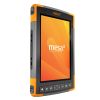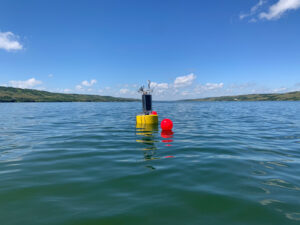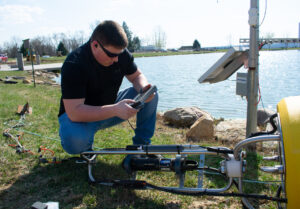Cedar CT8X2 Rugged Tablet Computer
The Cedar CT8X2 is a tablet designed for all-day use in any environment and offers impressive processing power running on an Android 10 operating system.
Features
- Water and dust resistant
- Optional barcode or RFID reader
- All day battery life
- Free ground shipping
- Expedited repair and warranty service
- Lifetime technical support
- More
Processing Power
As the most powerful Cedar tablet, the CT8X2 is equipped with a lightning-fast processor to provide impressive speed, display performance, image quality, and more.
Versatility of Android
Running Android 10, the CT8X2 utilizes Google Mobile Services (GMS) to access and run a variety of applications available on the Google Play Store.
GNSS Capabilities
Built to utilize the powerful u-blox M8 GNSS chip, the CT8X2 provides accurate GPS positioning for geo-located data collection. While consumer tablets produce accuracy within 3-10 meters, the CT8X2 has accuracy up to 1 meter in open sky and 5 meters under a dense tree canopy. Need higher accuracy? Pair the CT8X2 with the affordable Geode Sub-meter GPS Receiver.
Sleek and Rugged Design
Providing a step up in durability from consumer tablets, the CT8X2 is rated IP67 – making it resistant to water and dust. While the CT8X2 is rugged to its core, the lightweight exterior maintains a sleek design. The CT8X2 was built for use in extreme environments, with the ability to operate in temperatures ranging from -4 to 140 degrees Fahrenheit (-20 C to 60 C). A screen layered with Gorilla Glass makes multiple 1-meter drops to concrete without damaging the device.
Affordability
The CT8X2 offers added durability at a budget-friendly price when a consumer device just won’t cut it. Need to equip a large crew with devices? Quantity-based discount pricing is also available.
In The News
Applied Research and Innovative Solutions: Creating CHNGES at Western Kentucky University
Long-standing environmental monitoring programs have the power to support a large number of research initiatives and policy changes—however, actually starting these networks can prove challenging. Not only is starting the program difficult, but keeping things operational for decades to come has also been challenging for environmental professionals hoping to make an impact with applied research. Jason Polk, Professor of Environmental Geoscience and Director of the Center for Human GeoEnvironmental Studies (CHNGES) at Western Kentucky University, is all too familiar with this process.
Read MoreCombating Water Insecurity in Saskatchewan with Real-Time Data
The prairies of Saskatchewan can be described as one of the least water-secure parts of Canada, making water quality monitoring essential for informed resource management in a region already facing water insecurity. While natural physical properties worsen some of the poor water quality conditions in the region, others are connected to land use. Having grown up spending summers on the shores of Lake Huron, Helen Baulch, an associate professor at the School of Environment and Sustainability at the University of Saskatchewan , has always been dedicated to the protection of water resources. Looking back fondly at her childhood playing along the shore, Baulch also recalls the invasion of quagga mussels during her teenage years and watching the lake change as a result.
Read MoreSeametrics Turbo Turbidity Logger: Boost your Turbidity Monitoring
The Seametrics Turbo Turbidity Logger is a self-cleaning turbidity sensor capable of internally logging over 260,000 data records. The sensor enables researchers, compliance officers, and contractors to monitor turbidity in various applications, from construction and dredging sites to wastewater effluent. Due to its narrow width, this device can be deployed in a range of areas, from small well spaces to rivers and streams. The stainless steel housing and built-in wiper allow the sensor to withstand long-term deployments and reduce the need for maintenance trips. The logger accurately records temperature and turbidity up to a depth of 50 meters.
Read More















